

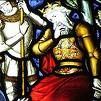
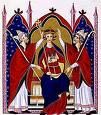


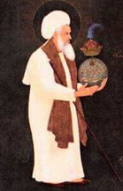
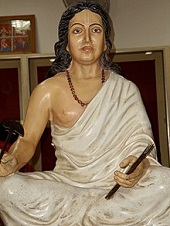
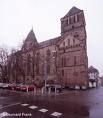
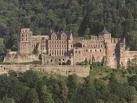

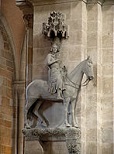
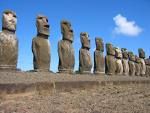


1200 Pop. of Paris: 50K; 60K Italian merchants live and work in Constantinople. All modern Ashkenazi Jews trace their roots to a group of about 330 people who lived in this cent. According to Austrian historian Friedrich Heer (1916-83), this year marks the line between the expansionary freedom era of Europe and the contracting repression era, known for persecution of Jews, heretics, women, lepers, witches, and homosexuals; according to Am. historianNorman F. Cantor (1929-2004), it should be 1270. John I of England and Philip II of France fight before the fortified town of Angiers, which swears allegiance to the king of England but wants to wait to see whether it's going to be John or Arthur; Sir Richard, bastard son of Richard I Lionheart (formerly Philip Falcounbridge, disinherited brother of Robert Falcounbridge, who gives up his inheritance for the name, saying, "Brother, you take my land, I'll take my chance", according to Shakespeare (King John, 1.1.151), proposes that they all combine temporarily and take Angiers first, causing John to propose that Philip II's son Louis the Lion marry Princes Blanche of Spain, and give Philip some of the disputed French land as dowry, which Philip accepts, his quarrel with Pope Innocent III diverting him anyway, causing him to abandon Arthur's cause; on May 25 Philip II and John I sign the Peace of Le Goulet, recognizing England's holdings in France, and recognizing Arthur as John's vassal, while ceding Vexin and Evreux, and promising the French a large sum of money; Arthur I, already duke of Brittany (since 1196) is created 1st earl of Richmond in N England, and lord of Angiers (until 1203). Is that wine all you want? On Sept. 7 Pope Innocent III lifts the interdict on France after Philip II discards his concubine Agnes. Welsh prince Llywelyn the Great (1173-1240) seizes breadbasket land Anglesey, and makes a treaty with John I of England, maintaining good relations for the next decade, and marrying John's daughter Joan in 1205; in the future Angelesey becomes the Achilles heel of the Welsh? Saladin's brother Melek al-Adil (al-Adel) Sayf al-Din (d. 1218) restores unity and becomes sultan of the Ayyubid Dynasty in Egypt and Syria. Alaeddin Takish dies, and his son Alaeddin (Ala ad-Din) Muhammad (Mohammed) II (-1220) becomes ruler of Khwarzem (until 1220). Yaroslav Vsevolodovich (b. 1191), 4th son of grand prince Vsevolod II the Big Nest of Vladimir is sent to rule the town of Pereyaslav near the Kypchak Steppes, beginning his rise to grate powah. King John of England marries 12-y.-o. Isabella of Angouleme (1187-1246), maternal great-granddaughter of Louis VI of France. Sergius, count of Senigallia in E Italy receives alleged relics of Mary Magdalene from the count of Marseilles as dowry for his daughter, causing an annual fair to be held by merchants from the Levant and Europe, becoming one of the largest in Italy. In this decade King John of England is allegedly excommunicated by Pope Innocent III for picking his nose, causing him to do penance. Early in this cent. the English strategy in Ireland changes from invasion to colonization, with immigrants coming from England, Wales, France, and Flanders, all being considered higher than the native Irish "betaghs" (serfs). Early in this cent. after Mongol conquests in the area turn him into an ascetic mystic, causing him to give away his wealth and go itinerant, visiting the seminaries in Bukhara and Samarkand to acquire religious learning, Herat, Afghanistan-born Persian mystic Sunni Muslim preacher Moinuddin Chishti (Chishti Mu'in al-Din Hasan Sijzi) (Khwaja Ghareeb Nawaz) (1142-1236 from Sistan settles in Delhi, India, moving to Ajmer, Rajasthan and founding the Chisti Order of Sunni mysticism in Ajmer and Lahore, Punjab, which becomes #1 in India, spawning Sunni saints Muhammad Nizamuddin Awliya (Auliya) (1238-1325), Abul Hasan Yamin ud-Din Amir Khusrau (Khusrow) (1253-1325) et al., going against Prophet Muhammad by permitting devotional music (qawwali) to attract Hindus, also spreading to Afghanistan. In this cent. the Writ of Trespass on the Case originates in the royal courts of London. In this cent. Jewish Kabbala (Qabbala) studies begin in the Christian Iberian kingdoms - when does Madonna sign up? In this cent. Islam begins to displace Buddhist religions in India. In this cent. Paris develops into a modern capital. In this cent. the Christian legend of the Wandering Jew begins to spread in Europe. About this time the English church requires that marriage banns be announced in church on three separate occasions. By this year the monastic revival in England, begun with the conquest, sees 500 new monasteries founded, and only 157 more during Henry III's long reign (1216-72); however, Cistercian houses now spread more rapidly than Cluniac, which have suffered spiritual decay; the new order of friars (non-secluded monks) begins to arise in this cent.; meanwhile in this cent. the papacy begins the policy of making provisions in England, providing benefices or incomes to papally-appointed parish priests, usually Italians; as a consequence, Italians who couldn't speaka da English begin to arrive in charge of parishes all over England, pissing-off the natives (see 1232). In this cent. the Ajuran (Ajuuraan) Sultanate in S Somalia is founded, working to make converts to Islam while engaging in tyrannical rule, spurring many rebellions that cause it to disintegrate by the end of the 17th cent. after fighting off an invasion by the Portuguese in the early 16th cent. and the Oromo people from S Ethiopia in the mid-17th cent. In this cent. the Kingdom of Sine (Siin) on the N bank of the Saloum River Delver in modern-day Senegal is founded by a group of animists from the Senegal River Valley fleeing Islam who meet up with the Gelwar Mandinka group coming from the SE; in the late 14th cent. more Mandinka immigrants arrive; the king (maad a sinig) rules from the capital of Mbissel; Mahecor Joof becomes the last king in 1924-69, after which the kingdom is incorporated into Senegal. In this cent. vanilla is first cultivated in Papantla, Mexico, and taken over by the Totonacs in Veracruz. The 800 y.-o. Buddhist U. of Nalanda in India (founded about 400) is destroyed by Muslims under Muhammad Bakhtiyar Khilji (-1206), the first Muslim conqueror-ruler of Bengal and Bihar, whose missionaries make a large number of converts while Buddhism declines in E India. About this time William I the Lion of Scotland charters the highland capital Inverness (Gael. "mouth of the River Ness") (modern-day pop. 63K) as a royal burgh. About this time the town of Tipperary (Gael. "Tiobraid Arann" = Well of the Ara) on the Ara River in Munster, S Ireland (AKA Tipp Town) (modern-day pop. 4.9K) is founded, becoming the home of the Clanwilliam barony and seat of County Tipperary; it goes on to house a large British army barracks that is used as a base by the Black and Tans; on Jan. 30, 1912 Jack Judge and Henry James "Harry" Williams compose the popular British music hall song It's a Long Way to Tipperary. About this time Chester Rows in Chester, Cheshire, England is established, consisting of first floor covered walkways leading to shop entrances, becoming the oldest continuously-occupied shopping mall on Earth. In this cent. the small border town of Braunau Am Inn in the Waldvertiel (wooded quarter) W of Vienna is founded, later becoming the birthplace of Adolf Hitler. The city of Amsterdam in the Netherlands is founded by this decade. In this cent. the seaport of Fukuoka (modern pop. 1M) on Hakata Bay in Japan is founded. In this cent. the Teutonic Knights found the town of Grodek (modern-day Grudziadz or Graudenz) in NC Poland on the Vistula River 60 mi. S of Gdansk (Danzig). In this cent. the independent duchy of Raciborz (Ratibor) on the Oder River 100 mi. SE of Breslau (Wroclaw) is founded by Duke Ratibor of Pomerania in memory of his marriage to Emma. In this cent. the Basques equip large sailing ships for hunting right whales in the Bay of Biscay. In this half-cent. the Seljuk Sultanate of Rum (founded 1077) in Anatolia (modern-day Turkey) reaches its zenith. Early in this cent. the Mon kingdom of Haripunjaya in Thailand is overrun by Thai (Shan) peoples from the N. About this time the Patzinak Turks NW of the Black Sea are converted to Christianity. During this cent. Jerusalem declines to the status of a village due to the waning of the Crusades and Ayyubid internecine struggles, and after the Crusaders are finally kicked out of the Middle East in 1291, the Christian pilgrims are fewer than before the Crusades started, and the Muslims are far less tolerant. In this cent. the Rhine River course shifts away from Duisburg, which is still on the Ruhr River. In this cent. the Samurai-like Aztecs ("people of the heron [Aztlan] place") leave their home near modern-day Mexcaltitan ("the Venice of Mexico") on Nayarit's San Pedro River Delta (450 mi. NW of Mexico City) and, under orders of their hummingbird-god Huitzilopochtli, move to the dry lands N of the Valley of Mexico to Tula, capital of the declining Toltec Empire, then change their name from Azteca to Mexica (pr. meh-SHEE-kah), and pick up Toltec culture; coming as refugees, they are assigned to a rocky area full of snakes, which they learn to enjoy as food - tastes like chicken? In this cent. the Athabascans migrate from Alaska to the Am. SW; the Anasazi (Ancestral Puebloan), Hohokam, and Mogollon cultures begin to move and disintegrate by 1300; the descendants end up in New Mexico by modern times. In this cent. Islam reaches Brunei? In this cent. the Walloon language emerges with a clearly-defined identity in SE Belgium (Wallonia) centered in Namur, combining French with German elements, although its pop. traces to the Celts. By this time the sweet potato is being cultivated in Polynesia; they got it from South Am.? About this time Easter Island (Rapa Nui) is settled by Polynesians from the Marquesas Islands or Gambier Islands led by Hotu Matu'a; they really came from South America because they brought the sweet potato?; they begin carving colossal Moai (stone figures), denuding the thick palm forest, causing the pop. to dwindle; their diet consists mainly of rats, and little seafood?; they actually walk the moai and don't waste trees? In this cent. soap reaches France. In this cent. engagement rings come into fashion in Europe. In this cent. English men begin to wear short hair which is kept bushy at the sides, cut close over the forehead, and curled below the ears (ends 1500), while women wear their hair in a caul, or curled and ornamented (ends 1400). For the first half of the cent. prices are on a rising trend in England; Italians develop banking firms, which compete with the Jews. In this cent. the English/British Bulldog is developed for bull-baiting; the first mention of the word "bulldog" is in 1631/2 by Preswick Eaton; in 1666 English scientist Christopher Merret gives it the scientific name Canis pugnax. In this cent. the Roman Catholic Church begins to be attacked for the corruption, greed, ignorance and immorality of its officials in all ranks, and its vast tax-free possessions, comprising up to one-third of all land in Europe, which pisses-off the landless peasants. In this cent. prof. bards begin working in Ireland. Early in the cent. the legend of the Wise Men of Gotham arises, about the village of Gotham in Nottinghamshire, 7 mi. SW of Nottingham, where King John intends to build a castle, but the villagers, not wanting to foot the bill feign idiocy until he changes his plans, with the soundbyte "We ween there are more fools pass through Gotham than remain in it." In this cent. wandering musicians settle down and acquire official recognition as town pipers in Europe. In this cent. trumpets begin to be used in battles in Europe to signal an attack. In this cent. the Mongols bring the tea-drinking habit to Persia. In this cent. the brewing of coffee into a beverage (as opposed to a medicine) is discovered by the Arabs, causing coffeehouses to proliferate in Arabia and Turkey, becoming gathering places for the intelligentisia; for the next 4 cents.; it becomes a capital offense to export fertile coffee seeds. About this time the soapmaking industry begins in England, centered in the large towns of Bristol, Coventry, and London, decimating woodlands to make wood ashes and causing a winter fuel shortage. The U. of Paris is chartered by French Capetian king (1179-1223) Philip II Augustus (1165-1223); in 1210 Pope Innocent III permits its teachers to form a corporation, and in 1212 gives them a degree of independence from the bishop of Paris; in 1215 it is chartered by Pope Innocent III, who on Nov. 16, 1219 prohibits the teaching of civil (Roman law), permitting only canon law to be taught; in Dec. 1219 new pope Honorius III supports the univ. in its conflict with the bishop of Paris; on Feb. 26, 1229 street battles between students and sgts. of the provost of Paris escalate, and on Apr. 15 the univ. temporarily vacates the city in protest, while students launch the first major student strike in history over the price of wine in a tavern in the Faubourg Saint-Marcel, with some leaving for Oxford and Cambridge in England; the name "Picard" originates as an academic epithet applied to its quarrelsome students. The first Red Masses (named from the red vestments symbolizing the red-hot Holy Spirit worn by celebrants) are held for those who seek justice, such as judges. In this cent. Euro adults begin developing the concept of childhood, according to French historian Philippe Aries (1914-84). In this cent. Verdun, France becomes famous for its Dragees (Dragée) hard-shell candy. Sports: In this cent. bowls (lawn bowling) (Lat. "bulla" = bubble) becomes popular in England, spreading to Scotland. Architecture: In this cent. Duke Leopold VI of Austria builds Burg Castle near Vienna. Early in this cent. St. Michael Paternoster Royal Church in London is built; the earliest record is dated 1219. The Gothic-Romanesque Church of St. Thomas in Strasbourg is begun, later going Protestant. The Facade of Notre Dame Cathedral in Paris is begun (finished 1250). In this cent. the Transition style Romanesque-Gothic Church of San Pablo (St. Peter) in Saragossa, Spain is built. King John of England orders the construction of King John's Castle on the S bank of the Shannon River in Limerick, Ireland (finished 1210). In this cent. Heidelberg Castle is begun on the ruins of a castle belonging to Charlemagne, becoming the #1 German historic landmark by modern times; the Heidelberg Tun (cellar) contains a 49K-gal. wine vat. Early in this cent. Balcony House in Mesa Verde in modern-day Colo. is built. Inventions: About this time chaperon ("little cape") headgear, consisting of a hood and a short cape is invented in W Europe, and it slowly grows into a complex, versatile and expensive fashion item, with a cornette (liripipe) (tippit) (becchetto) tail tied on top, a patte (cockscomb) (foggia) cape hanging behind, and a round bourrelet (rondel) (mazzocchio) tied around the face or twisted under the neck (beginning of a tie); by 1300 some prefer to wear it upside-down, and some prefer a scarf-like cornette. In this cent. Christian knights begin embroidering their family insignia on their surcoats, coining the term "coat of arms". Buttons for clothes are developed in this cent. - perfect to wear with the tidy whities, unless you're a Mennonite? By this this time the Guitar (Persian "tar" = string) is in use in Europe, incl. the Moorish guitar (Guitarra Moresca) and the Latin guitar (Guitarra Latina). About this time the Camshaft is invented in Iraq by Al-Jazari, who describes it in 1206; Europe picks it up by the next cent. In this cent. the Italians invent the Mannaia ("executioner's axe"), a type of horizontal guillotine, adopted by the Scots and Germans in the 16th cent. In this cent. Iron Anchor Chains, which were last used during the 1st cent. B.C. begin to be used again in Europe infrequently. In this cent. Mechanical Clocks (no water propulsion) begin to appear in Europe. Science: In this cent. alcohol begins to be used for medicinal purposes. Music: In this cent. the hymn Bogurodicza ("Mother of God") is written, becoming the first Polish religious hymn and the first known example of the Polish language. Nonfiction: In this cent. Sefer Raziel Hamalakh (AKA Liber Razielis Archangeli or the Book of Raziel the Angel), a Qabbalistic grimoire is trans. into Latin by the court of Alfonso X of Spain. Early in this cent. the Pre-Alphonsine Medieval Romance Bible (Biblia Medieval Romanceada Prealfonsina) is pub., becoming the first complete Spanish Bible. In this cent. Pedigree of the Saints (Achau'r Saint), The Book of Anerin, The Black Book of Caermarthen (Canu Myrddin), Vita Santorum Wallensium, De Situ Brecheniauc, Life of Carannog, Life of Cuby (Cybi), Life of Illtyd, and The Dream of Rhonabwy are written in busy little Ireland. In this cent. the 165-lb. 36 in. long x 9 in. thick Codex Gigas (Big Book) is supposedly created by Herman the Recluse in the Benedictine Monastery of Podlazice in Bohemia near modern-day Chrudim, Czech. in one night with the Devil's help, but really produced by a single monk over a 25-year period?; contains a large portrait of the Devil, causing it to be known as the Devil's Bible; in 1295 it is pawned to the Sedlec Monastery; in 1648 the Swedish army takes it as plunder, ending up in the Swedish Nat. Library, becoming the largest medieval ms. to survive to modern times; it took 160+ animal skins to make it; contains the Vulgate Bible, Josephus' "Antiquities of the Jews" and "De Bello Iudaico", Isidore of Seville's "Etymologiae", Cosmas of Prague's "Chronicle of Bohemia", two books by Constantine the African et al. In this cent. the 93-chapter Liber Juratus (Sworn Book of Honorius) is written, becoming a grimoire (magician's handbook). Plays: Jean Bodel (1167-1210), Jeu de St.-Nicholas (The Game of St. Nicholas) (Dec. 5) (St. Nicholas' Day) (Arras); the first known miracle play in France, in which St. Nicholas appears to robbers and persuades them to give their loot back. Poetry: Early in this cent. Fabliaux, bawdy (fart-heavy) farcical mainly anon. stories showing how the clever always win begin to circulate in France and Italy, spreading throughout Europe by the next cent. Hartmann von Aue (1170-1210), Der Arme Heinreich; a leper is cured by a young girl. In this cent. Indian Hindu Sanskrit poet Jayadeva (Jaidev) (1170-1245) of Puri, Orissa in E India composes the love poem Gita Govinda (Song of Govinda), about Krishna and the cowgirls (gopis) of Vrindavana, esp. cute little cowgirl Radha, who is presented as greater than Krishna, becoming important to Bhakti Hinduism and later incl. in the Guru Granth Sahib, the main scripture of Sikhism. About this time Suleyman of Bakirghan (a subject of the Khwarezmshahs) writes Poem on the Death of the Virgin, inspired by Nestorian writings. One way, or the other, I'm gonna getcha getcha getcha? In this cent. Holy Grail (san graal) (saint graal) legends begin to appear in lit., portraying it as a dish, cup, or magic talisman, and danbrowning, er, culminating in a woman, incl. the poem Lanzelet by Ulrich von Zatzikhoven, a 4-part French Arthurian work later used by Sir Thomas Malory that he claims came to Germany in the luggage of Hugh de Morville, one of the hostages for Richard I Lionheart while imprisoned by HRE Henry VI (1192-4); incl. Lancelot of the Lake (Launcelot du Lac), Quest for the Holy Grail (Queste del Saint Graal) by Galahad, Grand Saint Graal, The Death of King Arthur (La Mort du Roi Artu), and Roman de Joseph of Arimathea and Merlin (Le Roman de l'Estoire du Graal) by Robert de Borron (Boron), dedicated to Count Walter of Montbeliard (-1212), regent of Cyprus and constable of Jerusalem; Joseph of Arimathea and his followers allegedly brought the Holy Grail to Glastonbury, Britain, connecting King Arthur and Merlin with it; according to the 1982 book "Holy Blood, Holy Grail" by Michael Baigent, Richard Leigh, and Henry Lincoln, it's really "sang raal" or "sang real", i.e., royal blood, because Jesus Christ was married to red-haired Mary Magdalene, who fled to S France with their child after St. Peter staged a coup to oust her as first pope, and that bloodline has the right to be pope and king of the Jews and/or world, and the Holy Grail story was cooked up as a coverstory to keep the authorities off their trail. Births: German landgrave of Thuringia (1217-27) Ludwig (Louis) IV (d. 1227) on Oct. 28 in Creuzburg; son of Hermann I (-1217) and Sophia (daughter of Otto of Wittelsbach); brother of Henry Raspe (1204-47); husband (1220-) of St. Elizabeth of Hungary (1207-31); father of Hermann II (1222-41), Sophie of Thuringia (1224-75), and Gertrude of Altenberg (1227-97). French "Roman de la Rose" poet-scholar Guillaume de Lorris (d. 1240). Italian "Dies Irae" Franciscan friar-poet Thomas of Celano (d. 1255) in Celano, Abruzzi Province; becomes one of the first disciples of St. Francis of Assisi in 1215. English "Chronica Majora" monk-chronicler Matthew Paris (d. 1259) in Hildersham, Cambridgeshire; educated at St. Albans Abbey; known for illuminating his mss. with watercolors. Armenian historian Kirakos Gandzaketsi (d. 1271) (b. 1202?) in Gandzak (modern-day Ganja, Azerbaijan). Muslim Bektashi Persian Sufi mystic order founder ("Dervish of the Dervishes") ("Sultan of Hearts") Haji Bektash (Baktash) Wali (Veli) (1209-71) in Neyshabur, Khorasan (NE Iran); his mystic humanist combo Sunni-Shiite-Christian Bektashi belief system is later adopted by the Ottoman Janissary corps, teaching Alevism, worship in assembly houses rather than mosques, along with love, respect, and tolerance, equality of women, and monogamy. Austrian knight-minnesingerUlrich von Lichtenstein (d. 1278) in Murau; knighted in 1223 by Duke Leopold VI; gov. of Styria, which he helps bring into the Hapsburg Empire. Deaths: Chinese philosopher Zhu Xi (Chu Hsi) (b. 1130) on Apr. 23; leaves Commentaries on the Four Books of Confucius, which forms the basis of Chinese civil service exams in 1313-1905. English bishop St. Hugh of Lincoln (b. 1135); his tomb in Lincoln becomes a place of pilgrimage competing with Becket's in Canterbury.


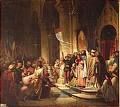
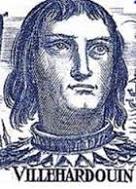
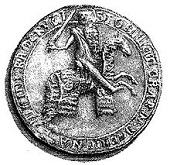

1201 In Apr. (Lent) Fourth Crusade envoys Geoffrey I of Villehardouin (Geoffroi de Villehardouin) (1169-1229) (Marshal of Champagne), Doge (1192-1205) Enrico (Henricus) Dandolo (1107-1205) et al. conclude the Treaty of Venice, with Venice, agreeing to transport 33.5K men and 4.5K horses in return for a 85K mark payment, and leave on June 29, 1202 for Egypt, which is thought to be the best route to the Holy Land; on May 24 Crusade leader Count Theobald III of Champagne (b. 1179) dies in Troyes, and his posth. son (born on May 30) Theobald (Thibaud) (Thibault) IV (the Troubadour) (the Chansonnier) (the Posthumous) (1201-52) succeeds him as count of Champagne in France (until July 8, 1253), immediately facing crushing debts from his crusading uncle Henry II of England, plus a succession dispute by Henry II's daughter Philippa and her hubby Erard I of Brienne, Count of Ramerupt (1170-1246), which takes until 1222 to resolve by buying him off; meanwhile in June the Assembly of Crusaders in Soissons elects famous Lombard soldier Marquess Boniface I of Montferrat (1150-1207) to lead the Crusade. In May King John sails to Normandy and seizes the lands of rebellious barons in Poitou; in June Philip II entertains him in Paris, ignoring the complaints of the Lusignans about his treatment of them. In June Pope Innocent III approves the Order of the Humiliati, who soon get into wool? On Dec. 25 a meeting is held in the forest town of Hagenau in Alsace-Lorrane between Philip of Swabia, dethroned Byzantine emperor Isaac II Angelus' son Alexius (brother of Philip's wife Irene), and Boniface, where a successful pitch is made to divert the Fourth Crusade to Constantinople to reinstate Isaac I, obviously in return for much baksheesh? Pope Innocent III openly espouses the side of Otto of Brunswick (son of Henry the Lion, duke of Bavaria and Saxony and his wife Matilda of England) in the contest for German king - that goes to show, try it before you judge? Sultan Suleyman II of Rum conquers Erzurum, then plans an invasion of Georgia from the SW - everybody needs good feet? King John of England grants the Jews a charter to live in Merry Ole Christian England - Merry Christmas? Bulgar Tsar Kaloyan makes peace with the Byzantines, being allowed to retain most of the E Balkan area. After landing in Riga last year with 500 Westphalian crusaders on 23 ships, Bishop Albert of Riga (Livonia) (Latvia) (1165-1229) founds the city of Riga, Latvia on the Gulf of Riga (modern-day pop. 641K/1M), transferring the seat of the Livonian bishopric from Ikskile, and builds a cathedral in 1221. The Hashemites begin ruling Mecca (to 1925). The first German merchants arrive in Novgorod via the Dvina River. Architecture: Early in this cent. St. Gotthard Pass is opened, connecting the northern German-speaking Swiss canton of Uri with the Italian-speaking southernmost Swiss canton of Ticino, which is on the route to Milan; in 1236 it is dedicated to St. Gotthard of Hildesheim. Births: Persian Shiite theologian-astronomer Nasir ad-Din (ed-Din) (al-Din) (Arab. "defender of the faith") Tusi (et-Tusi) (d. 1274) on Feb. 18; Mongol khan Hulegu builds him an observatory in Maragha. French poet, king of Navarre (1234-53), and count of Champagne (1201-53) Theobald (Thibaud) I/IV (the Troubadour) (the Chansonnier) (the Posthumous) (d. 1253) on May 30 in Troyes; posth. son of Thibaud III (1179-1201) and Blanche of Navarre (1177-1229) (youngest daughter of Sancho VI). French duchess of Brittany (1203-21) Alix (Alis) of Thouars (d. 1221) on Sept. 5 in Brittany; daughter of Duchess Constance of Brittany (1161-1201) and Guy of Thouars (-1213); wife of Peter I (1187-1250). French theologian (founder of the Sorbonne) Robert de Sorbon (d. 1274) on Oct. 9 in Sorbon. French "Bestiary of Love" deacon, surgeon and trouvere-philosopher Richard de Fournival (Fornival) (d. 1260) on Oct. 10 in Amiens; son of Roger de Fournival (physician of Philip II Augustus) and Elisabeth de la Pierre; half-brother of Bishop Arnoul of Amiens (-1246). Deaths: Persian scholar-soldier Imad ad-Din al-Isfahani (b. 1125) in Cairo, Egypt; leaves bios. of Sultan Saladin incl. "Kitab al-Barq a-Shami" (5 vols.), and "Al-Fath al-Qussi fi-l-Fath al-Qudsi". Danish statesman-soldier Archbishop Absalon (b. 1128). Christian prince of Antioch (1163-1201) Bohemond III (b. 1144) French duchess of Brittany (1186-96) Constance of Brittany (b. 1161) on Sept. 5 in Nantes (leprosy?). French count of Champagne (1197-1201) Theobald III (b. 1179) on May 24 in Troyes.







1202 The Fourth Crusade (ends 1204) finally gets going after only a fraction of the promised Crusaders trickle into Venice, and the whole affair gets in trouble for lack of the 85K marks, the fleet under Boniface of Montferrat finally accepts a Venetian proposal and starts down the Adriatic on Oct. 8, and on Nov. 11-24 despite a papal prohibition conquers and sacks the Christian city of Zara on the Dalmatian coast (known for their oak used in Venetian shipbuilding) to pay the Venetians for the ice cream trucks, er, ships and expenses. On Mar. 13 Polish duke (since 1138) Mieszko III the Old (b. 1126) dies, and his gay son Wladyslaw III Laskonogi (Spindleshanks) (1165-1231) becomes duke of Poland, but his cousin rival (son of Casimir II the Just) Leszek I the White (1184-1227) gets him deposed by 1206 and ascends to the throne of Cracow (main province in Poland), making him overlord of the other Polish dukes; meanwhile the nobles and clergy conspire to keep any ruler weak? The first trial of a peer in France, or, You've got a friend? On Apr. 28 after the barons of Anjou, Maine, Poitou, and Touraine protest to Philip II that he is oppressing their provinces, causing Philip II to summon his royal vassal to Paris to defend himself, King John fails to obey a summons to his court, claiming the feudal exemption of the duke of Normandy, pissing-off Philip II, who regards him only as the non-exempt count of Poitou and causing a French court to declare John to have forfeited his French fiefs (Aquitaine, Poitou, and Anjou), putting France and England back in war; the court awards them to John's nephew Arthur of Brittany, who claims the throne of England, raises an army, and sieges John's 80-y.-o. mommy Eleanor of Aquitaine at Mirebeau in Normandy, where she leads the defense personally; too bad, on Aug. 1 John swings south from S of Rouen with his mercenary army accompanied by his Anjou seneschal William de Roches and surprises Arthur, capturing him; too bad, John mistreats William de Roches and mistreats the rebel leaders, causing 22 to die, pissing-off the locals, who are their kin, causing John's regional allies in Anjou and Brittany incl. de Roches to switch sides to Philip II, raising a new revolt in Brittany, while Philip II keeps an army of 3,307 men incl. 257 knights on the Norman border to defend it; John's chamberlain Hubert de Burgh becomes Arthur's jailer in Falaise, and repeatedly refuses to obey John's orders to blind him? In May Pope Innocent III issues the decretal Venerabilem Fratrem Nostrum, outlining how the German princes have the right to elect a German king, but how the pope has the right to approve their choice before crowning him HRE because the papacy is superior to the whole empire - keep your head together and call my name out loud now? The Bulgarians campaign against the Serbs, taking Nish, then campaign against the Hungarians, driving them back over the Danube River. Sverre Sigurdsson dies, and his illegitimate son Haakon III (1175-1204) becomes king of Norway (until 1204), facing a resurgence of the rival Bagler party. Canute VI (b. 1163) dies childless, and his younger brother Valdemar II (the Victorious) (1170-1241) becomes king of Denmark (until Mar. 28, 1241), going on to take on the last remaining pagan tribes in the Baltic. Vukan II Nemanjic becomes grand prince of Rascia (Serbia) (until 1204). The Livonian Knights (Order of Livonian Brothers of the Sword) (German Order of Swordbearers) (Militia of Christ of Livonia) of warrior monks are founded by Bishop Albert of Riga (Livonia) (Latvia) (1165-1229) to convert the pesky pagan Finnish Livonians (N of the Lithuanians) to Christianity (finished 1236); Pope Innocent III sanctions them in 1204. Minamoto Yoriiye becomes Kamakura shogun #2. The first court jesters appear in European courts. Architecture: The Louvre in Paris (begun 1190) is completed. Krak des Chavaliers in Syria is damaged by an earthquake, causing it to be further reinforced. Nonfiction: Leonardo Fibonacci (1170-1250), Liber Abaci (Book of the Abacus); introduces the Hindu-Arabic place-value system and Arabic numerals to Europe, and discussing the Fibonacci Sequence ("How many pairs of rabbits can be produced from a single pair in a year's time?"); forever after science and sex are romantically intertwined in Euro minds? Poetry: Jean Bodel (1167-1210), Les Conges (Leave-Takings); autobio. poem written after he has to give up on participating in the Fourth Crusade this year when he contracts leprosy and retires to a leper colony in Arras. Births: English Franciscan scholastic scholar Bartholomew of England (Bartholomeus Anglicus) (d. 1272); educated at Oxford U. Dutch countess of Flanders (1244-78), countess of Hainaut (1244-53, 1257-80) Margaret II of Flanders (Constantinople) (d. 1280) on June 2; daughter of Baldwin I of Constantinople (1172-1205) and Marie of Champagne (1174-1204); sister of Countess Joan of Flanders (1200-44); wife of Bouchard IV of Avesnes (1182-1244) and William III of Dampiere (1224-51); mother of Baldwin (1217–1219), Count John I of Hainaut (1218–1257), Lord Baldwin (1219–1295) of Beaumont, Count William III of Flanders, Count Guy of Flanders, John I of Dampierre, and Joanna. Deaths: Polish duke (1138-1202) Mieszko III the Old (b. 1126) on Mar. 13. Persian poet Nisami (b. 1141). Italian Millennium Fever mensch Joachim of Fiore (b. 1135) on Mar. 30; dies a Catholic pop star, praised by Dante, Richard Lionheart et al.; his Armageddon-predicting followers become known as the Joachites (Joachimites). French trouvere Blondel de Nesle (b. 1155) (d. 1241?); his "L'amours dont sui espris" (Love, which I'm in love with) is later used in "Carmina Burana"'s song "Procurans Odium".


1203 On Apr. 6 after Bosnian ruler Kulin became a heretic in 1199 along with his family and 10K Bosnians, causing King Emeric of Hungary to see his chance and extend his influence over Bosnia, a synod is held at Kulik's instigation to limit Hungarian influence, resulting in the Abjuration of Bilino Polje that corrects errors in the Bosnian Church. Ain't it good to know you got a friend? On Apr. 20 the Fourth Crusaders leave Zara for Corfu, then take Durazzo, where Isaac II Angelus' son (by his wife Margaret of Hungary) (the Crusaders' eager-to-please accomplice) Alexius IV Angelus (Alexios IV Angelos) (1182-1204) is proclaimed emperor, and on June 23 they arrive in Constantinople and begin a siege, causing Alexius III to flee to Adrianople on the night of July 18, after which they free and restore Isaac II Angelus, and make him proclaim Alexius IV co-emperor on Aug. 1, becoming Roman Byzantine emperor #160 (until Jan. 28, 1204); as the Crusaders' puppet Alexius IV bankrupts the treasury to pay them a heavy tribute of 100K marks, and the Greek and Roman churches are remarried for the time being, on paper, but not in reality, as the patriarch has no intention of going to Rome to request the grant of the pallium and the believers ain't about to change any of their ways; meanwhile Alexius asks the Crusader army to delay their planned Sept. 29 (Michaelmas) departure for Syria for one year, giving them time to discover how totally incompatible they and their new bride are, resulting in spousal abuse and a permanent dysfunctional relationship? Evil King John throws away northern France with a lame move? In Apr. Duke Arthur I of Brittany (b. 1187) mysteriously dies in captivity in Rouen under the charge of John I's close friend William de Braose (Briouze), 4th Lord of Bramber, 3rd (7th?) Baron Abergavenny (1153-1211), who was paid off on Feb. 24 with a grant of the choice lands of Gower in the Welsh Marches of S Wales, making him the man who needs shades his future is so bright?; the Margam Annals later claim that John got drunk on the Thur. before Easter, personally killed his nephew, then threw him in the Seine River, where a fisherman later discovered him in his net, after which he was secretly buried in Notre Dame de Pres, the priory of Bec; Arthur's death ends the Angevin Plantagenet Dynasty in Brittany (begun 1181), and after John I is suspected of murdering him, the French unite against him (Shakespeare in King John claims that Arthur falls from a wall while making an escape after Hubert de Burgh chickens out in obeying John's order to blind and kill the innocent boy, but the barons think Hubert really did it and switch to the French side, all with no mention of Brownose?); white fairy-tale castle Chateau Gaillard on the Siene River near Rouen, France, built in 1196-8 by Richard I on a hill overlooking the town of Les Andelys, and held for King John by Baron Roger de Lacy, 6th Baron of Pontefract, 7th Baron of Halton (1170-1211) (AKA Roger le Constable) is sieged by Philip II of France after taking the town, and falls next year after a long seige and battles in underground tunnels, during which an undermined wall collapses into the moat, after which John retreats from France in Dec.; Arthur I's stepfather (2nd husband of Duchess Constance of Britanny) Guy of Thouars (-1213) becomes duke of Brittany and count of Richmond (until 1206) by right of his wife, who died in 1201, leaving him skating on thin ice, causing Philip II to take control, making him regent for his infant daughter Alix of Thouars (1201-21) (until 1213). The Almohads from Algeria and Denia conquer Mallorca (until 1229). The Battle of Basian 35 mi. NE of Erzurum sees 250K-300K Seljuks under sultan Suleyman II defeated by 90K Georgians under Queen Tamar and her hubby David Soslani 35 mi. NE of Erzurum, causing Suleyman to barely escape to Erzurum, and his brother Kilij Arslan ("Lion Sword") III (-1205) to become Seljuk sultan of Rum (until 1205). Temujin (Genghis Khan) defeats his rival Ongkhan (Wang Khan). Minamoto no Sanetomo (1192-1219) becomes Kamakura shogun #3 (until Feb. 13, 1219). The boys-will-be-boys island of Mont-Saint-Michel in Manche Dept., France begins a village below the fortress abbey that will later make it a tourist's dream; the fortifications around the 2-mi. base of the island (ramparts, towers and bastions) are added in the 16th cent. Births: Savoy count (1263-8) Peter II (the Little Charlemagne) (d. 1268) in Suze, Albon; 7th of 9 sons of Thomas I of Savoy (1178-1233) and Margaret of Geneva (1180-1252); brother of Philip I (1207-85); uncle of English queen Eleanor of Provence (1223-91); builder of Savoy Palace in London; husband (1236-) of Agnes of Faucigny (-1268); starts out as a prelate. Deaths: Flemish "universal doctor" Alain of Lille (b. 1114); leaves De Planctu Naturae (The Complaint of Nature) (satire on human vices), and Anti-Claudianus (treatise on morals); "Many false Christians of our time say there is no resurrection, since the soul perishes with the body." French duke of Brittany (1196-1203) Arthur I (b. 1187) in Apr.; killed by or under orders of King John of England.


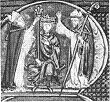
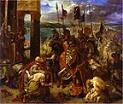
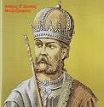

1204 Everyone wants an old school lord and master? On Jan. 1 after some Crusaders attack a mosque in Constantinople, causing citizens to confront them, and a fire ravages a section of the city, causing the Latin pop. to take refuge in the Crusader camp, Byzantine emperor Alexius IV launches fire ships at the Venetian fleet, which they stop; on Jan. 25 after pissed-off Greeks mad about paying money to stinkin' heretic Latins start a riot, Alexius III's son-in-law Alexius V Ducas (Alexios V Dukas) Mourtzouphlos (Gr. "bushy eyebrows"?) (1140-1204) sees his chance and has Alexius IV Angelus (b. 1182) and Isaac II Angelus (b. 1156) arrested and killed on Jan. 27/28, and is crowned as Byzantine emperor on Feb. 5 (until Apr. 12), ending negotiations with the Crooked Crusaders and refusing to make any more payments, while strenghtening the city defenses, personally leading a surprise attack on the Crusader camp and beating back a Crusader assault on Apr. 9; too bad, on Apr. 12-13 soldiers of the Fourth Crusade, comprised of French nobles and their followers, as well as Venetians and Flemings (OE "men from the lowlands"), surprise, capture, and Sack the Hell Out of Constantinople, then rub this date rape in by declaring it a marriage, announcing the Latin Empire of the East (Romania), based in Constantinople (ends 1261), conveniently cutting Venice's rival "La Superba" Genoa (who is backed by Greece) out of the trade routes; Alexius V ducks out and escapes to Mosynopolis in Thrace, HQ of deposed emperor Alexius III, and marries his daughter Eudocia Angelina, until his new father-in-law turns on him and has him blinded and cast out, after which the Crusaders under Thierry de Loos capture him in Nov., bring him back to Constantinople, condemn him for treason against their puppet Alexius IV, and throw him from the top of the Theodosian Column in Dec., and he becomes the last Byzantine emperor in Constantinople until 1261; Boniface of Montferrat captures Boukoleon Palace on the shore of the Sea of Marmara, discovering a gaggle of women incl. Empress Margaret, daughter of Bela II of Hungary, whom he marries; happy camper Pope Innocent Three Times is the Charm declares the Great Schism ended, but the icon-loving Greeks refuse to give up that easy, and the result is its permanent hardening within two generations as the rapee tries to get loose and turn states' evidence or set the bed on fire?; a council composed equally of Crusaders and Venetians divides the Eastern Empire, giving the imperial crown to Count (since 1194) Baldwin of Flanders, crowning him Baldwin I (1171-1205), Latin emperor #1 of the East on May 16 in Constantinople (until 1205); Thomas Morosini (1170-1211) of Venice replaces the Greek patriarch, becoming the first Latin patriarch of Constantinople (until July 1211); Boniface of Montferrat is made king of Salonika (Thessalonica), which incl. part of Thrace, Macedonia, and Thessaly; the rest of the empire is split up among various baron vassals; Venice receives three-eighths of the city, plus Adrianople, Gallipoli, Crete (until 1669), Euboea (a triarchy), Naxos, Andros, the SW tip of the Peloponnesus (Coron and Modon), Durazzo and other posts on the coast of Epirus, the Ionian islands, and some islands in the Aegean; some believe the Shroud of Christ is taken back to France among the huge loot of holy relics by Knight Templar Richard de Clare, 4th Earl of Hertford, Earl of Clare (1162-1218), along with many priceless treasures melted down into coins; the looting happened because the Venetians, who supplied the ships took so long that many Crusaders made their own way and thus underbooked them, causing them to look for a way to get paid?; actually the long-simmering animosities between Venice and Constantinople, exacerbated by religious rivalry and that old Greek-Roman thang helped to breed a bank-robber-in-the-family mentality?; Pope Innocent III professes to be (really is?) shocked (innocent?), along with most of Europe, and excommunicates the Venetians for it, but makes hay of his opportunity to Latinize the Greek Orthodox Church, hardening the schism further; in 1207 after living through the Apr. 13, 1204 battle for Constantinople between the W Euro Roman Catholics and Byzantine Orthodox Catholics, French marshal of Champagne Geoffrey of Villehardouin (Geoffroi de Villehardouin) (1160-1212) begins writing De la Conquete de Constantinople (On the Conquest of Constantinople), a 3rd person memoir in lovely French, becoming one of the first works of French prose - another day here in the park, I think it was the Fourth of July, or, what a lady what a night, or, get that icon down? Now you know why they call him Augustus? In Mar. despite King John's attempts to raise more money to hire mercenaries for his war in France, Chateau Gaillard is captured; John sends a peace embassy to negotiate in the spring, but Philip II takes advantage of him being busy honeymooning in Rouen to conquer all of Normandy except the Channel Islands by June, playing the Norman barons off against each other, backed by the towns and rich bourgeoisie; Philip II, now master of Normandy, Anjou, Brittany, Maine, and Auvergene then retakes English-held (since 1152) Touraine in WC France, but is stopped at Poitou as John's vassals in S France finally decide they prefer an absent Angevin to a nearby Capetian, and stop Philip S of the Loire River; the loss of all of John's Angevin holdings in France N of the Loire River (Anjou, Maine, Normandy, and Touraine) except Aquitaine (minus part of Poitou) reduces England's power and prestige, and cuts the Norman barons off, making them begin to look to England rather than France for their future and take more interest in their English rights, leading to the Magna Charta of 1215?; Normandy remains under French control for the next two cents. (except 1346) (until 1415). On Nov. 14 Pope Innocent III writes to the Roman Catholic clergy in the East, calling the transfer of imperial power in Constantinople from the Greeks to the Latins "the Lord's doing, and it is marvelous in our eyes", a quote from Psalms 118:23; the overthrow of the Byzantine Empire leads to successor Latin states in Greece; Michael I Comnenus Ducas (Michael I Komnenos Doukas) (1170-1214) sets up the independent Greek Empire (Despotate) of Epirus (ends 1340, then 1356-1479), which attempts to expand to the E and lasts until the Turks take it over in the 15th cent.; Theodore I Comnenus Lascaris (Theodoros I Komnenos Laskaris) (1174-1222), son-in-law of Alexius III founds the Empire of Nicaea in Bithynia (which eventually becomes top dog) as Theodore I (until 1221), and makes an alliance with sultan Kilij Arslan III of Rum to block the Crusader advance into Anatolia, but is defeated by the Crusaders under Peter de Bracheuil; Alexius III and David Comnenus sets up the Empire of Trebizond (Trapezuntine Empire) on the N coast of Anatolia, with Alexius at Trebizond and David at Sinope (ends 1461); the capture of Big C ends trade with Kiev, causing it to further decline until its final destruction by the Mongols in 1240; after they pass him as Latin emperor of Constantinople for Baldwin of Flanders because his brother Conrad married into the Byzantine royal family, the Venetians send Crusade leader Boniface of Montferrat (1150-1207) to conquer Thessalonica, which he does, founding the Kingdom of Thessalonica (ends 1224), which acknowledges subordination to Baldwin I, expanding by next year S through Thessaly, Boeotia, Euboea, and Attica; meanwhile crusading barons led by Burgundian nobleman Otto (Othon) II de la Roche (1170-1234) conquer Attica and the Peloponnesus, and he becomes the first duke of Athens (until 1225), acquiring Thebes by 1211; Bulgarian Tsar Kaloyan uses the opportunity to firm his kingdom up, seizing W Macedonia and aligning with Pope Innocent III, who sends a papal legate to crown him, along with a primate for Bulgaria. Emeric I (b. 1174) dies, and his 5-y.-o. son (by Constantia of Aragon) Ladislas III (1199-1205) becomes Arpad king of Hungary (until 1205). Haakon III dies, and Birkebeiner faction man Inge II Baardson (1185-1217) becomes king of Norway (until 1217). Jaffa is recaptured by the Roman Catholic Christians, who hold it until 1268. Sultan Kaykhusraw I regains the throne of Rum (until 1211). John of Ibelin (1179-1236) becomes lord of Beirut after relinquishing the office of constable of Jeruslam, going on to rebuild it and construct an opulent palace, which becomes the home of the Ibelin family for the rest of the cent.; he lives so long that he becomes known as the Old Lord of Beirut. The Assizes of Romania, a clone of the Assizes of Jerusalem are created to govern the new Latin Empire of the East. Vicenza U. in Veneto, Italy is founded. The coal trade of Newcastle-upon-Tyne (2nd cent. C.E. Roman town of Pons Aelius and 5th cent. C.E. Anglo-Saxon Northumbrian town of Monkchester/Munucceaster) (modern-day pop. 300K/879K) is founded as King John accepts money in exchange for deforestation rights - later becoming the home of Eric Burdon and the Animals? The sack of Constantinople ends the production of Tyrian purple, although it continues in Egypt until ?; W Europe turns to vermillion (crimson) (grana), produced by the insect Kermes vermilio. Philip II of France begins replacing feudal prevots (prévôts) with royal baillis and senechaux (sénéchaux) on his new Capetian lands, extending royal collection of customs, tolls, fines, and fees, but as yet no modern-style taxes. The bronze horses that once adorned the triumphal arch of Nero at Rome are taken from Constantinople to Venice. Births: Spanish king of Castile and Toledo (1214-17) Henry I of Castile (d. 1217) on Apr. 14 in Valladolid; son of Alfonso VIII (1155-1214) and Eleanor of England (daughter of Henry II of England and Eleanor of Aquitaine); brother of Ferdinand of Castile (1189-1211). German landgrave of Thuringia (1241-7) Henry (Heinrich) Raspe (d. 1247); brother of Ludwig IV (1200-27). Deaths: English queen of France (1137-52) and England (1154-89) Eleanor of Aquitaine (b. 1122) on Apr. 1 in Fontevraud Abbey; outlives all her children except King John and Queen Eleanor of Castile. Spanish-born Jewish physician-philosopher-rabbi Moses Maimonides (b. 1135) on Dec. 13 in Cairo, Egypt; buried in Tiberias, Palestine; his example causes medicine in Egypt to be dominated by Jews; "Everything except God has been brought into existence out of nonexistence"; "The other nations vanish, but the Jews last forever"; "The nation of Ishmael, who persecute us severely, and who devise ways to harm us and to debase us... No nation has ever done more harm to Israel. None has matched it in debasing and humiliating us. None has been able to reduce us as they have... We have borne their imposed degradation, their lies, and absurdities, which are beyond human power to bear." Greek Byzantine emperor (1185-95, 1203-4) Isaac II Angelus (b. 1156) in Jan. (executed). Bosnian ruler (1180-1204) Ban Kulin (b. 1163). Greek Byzantine emperor (1203-4) Alexius IV Angelus (b. 1182) on Feb. 8 (executed). Spanish (Cordova) Muslim astronomer Nur ad-Din Ibn Ishaq al-Bitruji (Alpetragius) (b. ?); leaves the astronomical treatise Kitab-al-Hay'ah, criticizing Ptolemy's system of epicycles and eccentricities and substituting a system of geocentric spheres. which spreads through Europe for the rest of the cent.
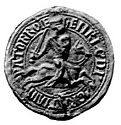

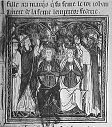

1205 On Apr. 1 Amalric II (b. 1145) dies in Acre, and his son Hugh (Hugues) I de Lusignan (1194-1218) becomes king of Cyprus (until Jan. 10, 1218), while the throne of Jerusalem-Acre passes to 13-y.-o. Maria of Montferrat (1192-1212), daughter of his wife Isabella by her previous marriage to Conrad of Montferrat, with her half-brother John of Ibelin, lord of Beirut as regent (until 1210). The Latins take over Byzantium only to inherit their problem with the Bulgar buggers? On Apr. 14 the Bulgars under Kaloyan, supported by the Cumans and local Greeks kick Frankish Crusader butt at the Battle of Adrianople, and capture Emperor Baldwin I (b. 1172), imprison him in Baldwin's Tower in Veliko Tarnovo, then kill (poison?) him; after receiving the bad news, next Aug. 20 his brother Henry of Flanders (1174-1216) succeeds him as Henry I, Latin emperor of Constantinople #2 (until June 11, 1216) (the ablest of the Latin emperors?) while the Bulgars overrun Thrace and Macedonia and exterminate much of the Greek pop. On July 13 Archbishop of Canterbury and Chancellor Hubert Walter dies; his influence was so great that King John utters the soundbyte: "Now, for the first time, am I truly king of England"; King John persuades the older monks of Canterbury to elect Norwich Bishop John de Grey (Gray), but in Sept. a group of younger monks elect Subprior Reginald, with both parties sending missions to Rome. Ladislas III is dethroned (killed?) by his daddy Emeric I's brother-rival Andras (Andrew) II (-1235), who becomes Arpad king of Hungary, going on to spend the kingdom into bankruptcy - are you aware that you have some addictions? Guillaume (William) de Champlitte (1160-1209) and Geoffrey of Villehardouin conquer Achaea, and divide it into 12 feudal baronies on the French pattern (until 1278), with William I of Champlitte becoming prince #1 of Achaea (until 1209); the Achaean armorial is a cool yellow Latin cross on a red shield; despite being run by Roman Catholics, the Orthodox Greco-Slavic pop. is well treated and the govt. is popular with them? The seaside town of Cumae in S Italy is destroyed by the Neapolitans retaliating against pirates operating there, leaving nothing but ruins. As of this year all Englishmen over the age of 12 are subject to military service, with many being pressed into navy service - I think you're ready for battle, what do you think? Science: The first written Christian reference to using a magnetic compass for navigation. Poetry: Layamon, a priest on the Severn River writes Brut, a rhymed chronicle in the Middle English dialect, based on the "Roman de Brut" of Wace, introducing the Arthurian legend starting with Brut (Brutus), great-grandson of Aeneas, who settled London and became Britain's first king; "The most valuable single production in English speech between the conquest and Chaucer" (William Henry Schofield). Births: ChineseSong emperor #14 (1224-64) emperor Li zong (Zhao Yun) (Zhao Yuju) (Zhao Guichent) (d. 1264 on Jan. 26 in Shaoxing, Zhejiang. Kurdish Ayyubid ruler of Egypt (1240-9) As-Salih Ayyub (Al-Malik as-Salih Najm al-Din Ayyub) (d. 1249) on Nov. 5 in Cairo; son of Al-Kamil. Bohemian king (1230-53) Wenceslaus (Wenceslas) (Wenceslav) (Vaclav) I Premyslid (d. 1253); son of Ottokar I (1155-1230) and Constancia of Hungary; maternal grandson of Bela II and 2nd wife Agnes of Antioch. German semi-legendary knight, lyric poet and minnesinger Tannhauser (d. 1270); seeks absolution afer giving himself up to revelry in the Venusberg. Italian surgeon-bishop Theodoric Borgognoni of Lucca (d. 1298) in Lucca; educated at the U. of Bologna; student of Hugh Borgognoni. Deaths: French Waldensians founder Peter Waldo (b. 1140). Cyprus king (1194-1205) and Jerusalem king (1197-1205) king Aimery (Amalric) II (b. 1145) on Apr. 1 in Saint Jean d'Acre; dies of dysentery after a "surfeit of white mullet" (poisoned?). English archbishop of Canterbury (1193-1205) Hubert Walter (b. 1160) on July 13. Latin emperor of Constantinople #1 (1204-5) Baldwin I (b. 1172) in Veliko Tarnovo (murdered). Jerusalem queen (1190-1205) Isabella I of Jerusalem (b. 1172) on Apr. 5 in Acre. English archbishop of Canterbury (1193-1205) Hubert Walter (b. ?) on July 13.




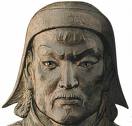
1206 On Mar. 15 Mohammed of Ghor (b. 1149) dies after completing his conquest of N India, turning the former caste-conscious Brahma-Vishnu-Shiva worshipers into Allah-akbar shouters; Delhi viceroy (former slave) Kutub (Qutb) al-Din (Kutb-ud-din) (not to be confused with the Persian Muslim astronomer born in 1236), leader of the Muslim raiders in N India proclaims himself sultan, and sets up the Slave Sultanate of Delhi (ends 1288) as an independent Muslim state in Delhi (part of the Khivan Empire) called Hindustan. In June King John lands in France at La Rochelle to defend Aquitaine, and captures a castle in Gascony, then moves N and captures Anjou; on Oct. 26 John and Philip II agree to a 2-year truce, and John returns Anjou to France. On Dec. 11 after Subprior Reginald spills the beans on his trip to Rome for confirmation, King John forces them to elect John de Grey as Canterbury archbishop; meanwhile Pope Innocent III has his own ideas, and invalidates both of them and selects his old Paris U. student friend Stephen Langton (1156-1228) (inventor of the chapter division of the Bible this year) to fill the vacancy, but John refuses to recognize his election, protesting that this Frenchie has no political qualifications, starting a 6-year war. Temujin ("iron-worker") is acknowledged as the supreme leader of the steppes at a kuriltai (tribal meeting), and given the name Genghis (Chingis) (Jengis) Khan (1162-1227), "emperor of all emperors" (chief prince of the Mongols), uniting the Mongols and molding them into a fighting force before invading Manchuria; the Yassa (Yasa) is secretly created to force fierce military discipline through the empire - I don't care, it's 5 o'clock somewhere, let's get going? St. Sava (1174-1236) brings the body of his daddy St. Stefan I Nemanja's (b. 1199) back to Serbia, and reburies it in Studenica Monastery, where holy oil again allegedly seeps from his tomb, causing the civil war between his sons Stefan II and Vukan II to end, and the Cult of St. Simeon to be founded. Yaroslav Vsevolodovich is summoned by the boyars of Halych (Galicia) on the Dniester River in W Ukraine to rule their town, but fails to stick, after which his daddy Vsevolod III sends him to take Ryazan, but they resist so stubbornly that he burns it - things are always better when they fit you right? Spanish Castilian priest St. Dominic (Domngo Felix de Guzman) (1170-1221) attempts to convert Albigensians in Prouille, France with litttle success until he allegedly receives a vision of the Blessed Virgin, who gives him the Rosary as a tool against heretics, going on to found the Dominican Order (Order of Preachers, which is approved by Pope Honorius III via the bull Religiosam vitam of Dec. 22, 1216. Bonds issued by the govt. of Venice (first issued in 1157) become negotiable and transferable, becoming the first negotiable gold certificates; Como does ditto in 1250. Inventions: U. of Paris prof. Stephen Langton introduces the Chapter Division of the Bible - that way we can keep hoping to read Christ's imminent return in between the lines? Births: Bavarian Wittelsbach duke and count palatine of the Rhine (1222-53) Otto II (the Illustrious) of Bavaria (d. 1253) on Apr. 7 in Kelheim; son of Louis I (1173-1231) and Ludmilla of Bohemia (-1240). Hungarian-Croatian king (1235-70) Bela IV (d. 1270); also Bela III of Croatia (1235-70); son of Andras II (1175-1235) and 1st wife Gertrude of Merania (1185-1213) (sister of Merania, wife of Philip II of France).

1207 On June 17 Pope Innocent III consecrates Stephen Langton at the papal palace in Viterbo (40 mi. NW of Rome), and in Aug. threatens an interdict against King John; not phased, John bans Langton from England, threatens to burn the cloisters over any rebellious monks, and swears "by the teeth of God" that if the interdict is laid on England he will banish all Roman Catholic clergymen from England, and put out the eyes and cut off the noses of some for funners. In Oct. Kaloyan is killed (murdered?) while sieging Salonika (Thessalonica), and his nephew (son of his sister) Boril (-1218) becomes tsar of Bulgaria (until 1218), causing the intended heirs Ivan Asen and Alexander to flee; he adopts the Byzantine appanage system, preventing the emergence of self-governing cities; meanwhile the snubbed Asen family heirs attempt to set up independent principalities. Theodore I Lascaris of Nicaea, allied with the Seljuks of Rum defeats David Comnenus and drives him back to Sinope, then concludes a truce with Latin emperor Henry I to oppose the advance of Alexius III of Trebizond, who is allied with the Seljuks. Papal legate Pierre de Castelnau (-1208) excommunicates Count Raymond VI of Toulouse (1156-1222) for supporting (tolerating) the Cathars (Albigensians). Bishop Albert of Livonia begins fortification of the new (1201) bishopric town of Riga at the mouth of the Daugava River on the Gulf of Riga (modern-day pop. 641K/1M) with Philip of Swabia investing bishop Albert of Riga with Livonia as a fief and principality of the Holy Roman Empire; the Livonian Order is given one-third of all the land in order to create a standing army; Bishop Albert otains papal bulls giving German merchants a mandate to carry on all Baltic trade through Riga, insuring its commercial success, becoming the largest city in Latvia. Seljuk sultan Kaykhusraw I of Rum seizes Antalya from the Byzantines, giving Rum a port on the Mediterranean. Pope Innocent III switches sides in the contest for HRE from Otto of Brunswick to Philip of Swabia; too bad, he dies next year before he can be officially crowned. The port city of Liverpool (OE "muddy pool") (modern-day pop. 485K/2.4M) on the E side of the Mersey Estuary in NW England is chartered by Beatle, er, King John as a borough; the name was first mentioned about 1190 as Liuerpul; King John designs the street plan, with seven streets laid out in an H shape, incl. Bank (later Water) St., Castle St., Chapel St., Dale St., Juggler (later High) St., Moor (later Tithebarn) St., and Whiteacre (later Old Hall) St.; since 18333 the inhabitants are called Liverpudlians, also Scousers (after the local stew scouse or lobscouse); in 1699 Parliament makes Liverpool a parish, and its first slave ship Liverpool Merchant sails for Africa; since Roman times the nearby town of Chester on the Dee River has been the principal Irish Sea port, but as it silts up Liverpool takes over; in modern times middle-class Liverpudlians are called Liverpolitans. Poetry: Anon., Poema del Cid; written in Vivar, Spain. Art: Unkei, Asanga (sculpture). Births: Persian Mevlevi Sufi (Whirling Dervishes) founder and mystical poet Mawlana (Mevlana) Jalaluddin (Jalal al-Din) Muhammad Rumi (Balkhi) (d. 1273) on Sept. 30 in Balkh, N Afghanistan; flees from the Mongols W to Konya in Anatolia (Iconium) near the Neolithic ruins of Catal Huyuk, preaching a gospel of love. English king #28 (1216-72) Henry III (of Winchester) (d. 1272) on Oct. 1 at Winchester Castle; son of John I (1167-1216) and Isabella of Angouleme (1187-1246). Hungarian princess (St.) Elizabeth (Elisabeth) (Heb. "pledged to God") of Hungary (d. 1231) on July 7 in Sarospatak; daughter of Andras II (1175-1235) and Gertrude of Andechs-Merania (1185-1213); canonized in 1235; feast day: Nov. 17/19; wife (1220-7) of Ludwig IV of Thuringia (1200-27); mother of Hermann II (1222-41), Sophie of Thuringia (1224-84), and Gertrude of Altenberg (1227-97). Savoy count (1268-85), bishop of Valence (1241-67), and archbishop of Lyon (1245-67) Philip I (d. 1285) in Aiguebelle; 8th son of Thomas I (1178-1233) and Marguerite of Geneva (1180-1252); brother of William of Savoy (-1239); father of Amadeus V (1249-1323). Deaths: German minnesinger Reinmar the Old of Hagenau (b. ?); born in Alsace.

1208 On Jan. 15 a knight working for Count (since 1194) Raymond VI of Toulouse (1156-1222) kills papal legate Pierre de Castelnau, and Pope Innocent III deposes him for it; the pesky Byzantine heretics seemingly in hand, Pope Innocent III first vainly appeals to Philip II of France, who refuses to get involved, then proclaims a Crusade against #2 on his list, the Cathars (Albigensians) (Catharists of Albi) ("the Western Buddhists"), a group of sects of too loose heretical dualistic vegetarians in S (Provencal) France centered in Toulouse, which started out as a reaction against clerical corruption but was joined by the nobles as a way to appropriate Church lands, becoming fabulously wealthy and getting mixed-up with the Templars; believing that Christ was a prophet of Amor (love), they refuse to make a big deal of the Crucifixion, which they regard as an emblem of Rex Mundi (Lord of the Material World), which has twisted Amor into its opposite, Roma, also denying the sacraments of Baptism and Communion, and practicing birth control and abortion, accepting reincarnation and the female principle, allowing women parfaits (priests), and insisting on direct personal contact with God rather than mere faith; looking for a get-out-of-purgatory-free card, Duke Eudes III of Burgundy steps up to the plate and organizes a campaign against the Cathar strongholds in Languedoc next year, starting the Albigensian Crusade (ends 1229). On Feb. 24 (Feast of St. Matthias) (St.) Francis of Assisi (1182-1226) (Giovanni Francesco Bernardone) takes up the Apostolic life. On Mar. 24 Pope Innocent III gets the bishops of London, Ely, and Worcester to impose an interdict on England suspending all ecclesiastical rites except for baptism and extreme unction, closing churches and burying the dead in unconsecrated ground, after which they are forced to flee England; King John seizes the revenues of Canterbury and drives its monks into exile, causing Archbishop Geoffrey of York to excommunicate the king's tax collectors and flee to France; the clergy support the interdict despite the consequences, and the commoners are distressed, but the nobles aren't too pissed off at King John, as he confiscates the property of all clergy who obey the pope, leaving their own wealth alone - I am Sharpei all the way? On June 21 just when he had the German throne sewn up, and had made a deal to marry off one of his daughters to the pope's nephew and give him the dukedom of Tuscany, Philip of Swabia (b. 1177) is murdered in Bamberg by Bavarian count palatine Otto VIII von Wittelsbach (1180-1209) for refusing the hand of one of his daughters, and on Nov. 1 the Diet of Frankfurt confirms his election as German king; Pope Innocent III can count to one, and switches to his side again. On June 30 after invading Thrace and defeating the Crusaders in June at the Battle of Beroia (Stara Zagora), 33K Bulgarians under Boril are defeated by the main Crusader force of 2K knights plus several thousand soldiers at the Battle of Plovdiv (Philippopolis); this time the Crusaders don't fall for the same tricks as in Adrianapole, and instead lure Boril into a trap, causing him to flee and his army to follow; he refuses to give up and make peace until 1213. Gwenwynwyn ab Owain Cyfeiliog (-1216), ruler of S Powys in middle Wales is arrested by King John of England, allowing his son-in-law Llywelyn the Great to steal Powys and Ceredigion (until 1210), becoming the last major ruler of middle Wales before the 1066 Norman Invasion. Ermengol VIII (b. 1158) dies, and his daughter Aurembiaix (Aurembiax) (1196-1231) becomes the last count of Urgell in N Spain. Pope Innocent III warns the Knights Templar about their unchristian behavior incl. necromancy. Fulda in Hessen, C Germany, home of a Benedictine abbey since 744 becomes a town. Births: Spanish king of Aragon, count of Barcelona, king of Majorca, and lord of Montpellier (1213-76), and king of Valencia (1238-76) James I (the Conqueror) (d. 1276) on Feb. 2 in Montpellier; only son of Peter II of Aragon (1174-1213) and Mary of Montpellier (1182-1213) (daughter of William VIII of Montpellier); soon after his birth Peter II dumps his mommy Mary, who becomes a local saint for her piety and marital suffering; father of Peter III of Aragon (1239-85) and James II of Majorca (-1311). English soldier ("Father of the English Parliament") Simon de Montfort, 6th Earl of Leicester, 1st Earl of Chester (d. 1265) on May 23 in France; son of famous Albigensian Crusader Simon de Montfort, 5th earl of Leicester (1160-1218). Mongol Great Khan (1251-9) Mongke (Möngke) (Mangu) Khan (d. 1259); son of Genghis Khan's son Tului and a Nestorian woman; elder brother of Kublai Khan (1214-94) and Hulagu Khan (1217-65). Turkish humorist writer Nasrettin Hoca (d. 1284) in Sivrihisar. Deaths: German king (1198-1208) Philip of Swabia (b. 1177) on June 21 in Bamberg (assassinated).



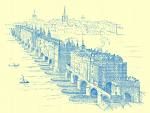

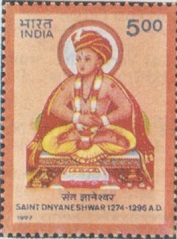
1209 A 140-year drought begins in Calif. (ends 1350), causing water levels to drop 50+ ft. On Mar. 30 (Easter Mon.) Black Mon. sees 500 English settlers from Bristol massacred in Dublin, Ireland by the O'Byrne Clan near Ranelagh Wood, starting a trend (1351, 1360). In Apr. after a decade of negotiations over Northumberland, rumors that William I of Scotland is negotiating with the French cause John I to come N with an army and meet him personally at Roxburgh, where they face each across the Tweed River, and after a lot of diddley doo William caves in, signing an agreement on Aug. 7 at Norham agreeing to pay John 15K marks, renounce his rights to Northumberland but reserve them for his son Alexander II when he comes of age, and give his daughters Margaret and Isabel to John's care so that one of them might marry one of his sons Henry or Richard and produce an heir that would become Alexander's heir. On June 18 Raymond VI of Toulouse does public penance; on July 22 after 30K Crusader knights and foot soldiers under Simon de Montfort storm Languedoc in SE France along the Garonne River, the most advanced and civilized section of France, known for religious tolerance along with mass abandonment of Roman Catholic faith, 15K-20K are massacred in Beziers (Béziers) after an officer allegedly asked a papal rep how to distinguish Cathar heretics from true Roman Catholic believers, and was told "Kill them all, God will recognize his own"; they then do ditto to Perpignan, Narbonne, Carcassone, and Toulouse. On Oct. 4 Otto of Brunswick, Welf count of Flanders is crowned HRE Otto IV (1175-1218) by Pope Innocent III (until 1215). Theodore I Lascaris of Nicaea repulses a 2nd attempt by the Crusaders under Peter of Bracheuil to conquer Bithynia and gain access to Anatolia. In Nov. after King John meets with Stephen Langton's brother Simon, then decides to confiscate the property of clergy who refuse to celebrate their offices, Pope Innocent III excommunicates him; John responds by invading Scotland and holding the children of suspect barons as hostages to insure their loyalty. William of Champlitt dies, and Geoffrey I of Villehardouin (1160-1218) becomes prince of the Latin principality of Achaea (until 1218). Peter II names his uncle Count Sancho of Roussillon, gov. of Provence and Languedoc as regent for James I the Conqueror (b. 1208) (until 1213). Pope Innocent III commissions Cistercian monk Christian to convert the heathen Prussians; meanwhile Hermann von Salza (1179-1239), friend and councilor of HRE Frederick II becomes grandmaster #4 of the Teutonic Knights (until Mar. 20, 1239), with his first Mission: Impossible being to defend Transylvania against the pesky Cumans. The Council of Avignon mocks Jewish laws of cleanliness by prohibiting "Jews and harlots" from touching bread or fruit exposed for sale, renewing Church laws against Jews hiring Christian servants, and warning the faithful not to exchange services with Jews, but to avoid them as a pollution. A student at Oxford U. kills a woman and flees, and his roommates, vainly claiming clerical immunity are hanged in his stead, causing teachers and students to leave Oxford for close (but not too close) (80 mi.) Cambridge(shire) ("bridge over the Cam or Granta River") in protest until a new agreement is made with the town in 1214; when some like it and decide to stay, the second great English U. is born, eventually forming the Oxbridge nexus of English eggheads - like switching from Ford to Chevy but staying with Detroit? Genghis Khan defeats the Kirghiz and Uighurs, then invades NW China and conquers the Tanguts (Western Xia) (of Tibetan origin). St. Francis of Assisi issues the first Rules of the Franciscan Brotherhood, with the First Order being Friars Minor. Architecture: The stone London Bridge across the Thames River is completed after 33 years (begun 1176), with the Chapel of St. Thomas on the Bridge in the center dedicated to martyr Thomas Becket, becoming the official start of the pilgrimage to his shrine in Canterbury; in 1212 a fire breaks out on both ends; by 1358 it is home to 138 shops plus a number of latrines; another fire during Wat Tyler's Peasant Revolt of 1381 burns a number of houses, and ditto during Jack Cade's rebellion of 1450; a major fire in 1633 destroys the northern third of the bridge, forming a firebreak preventing further damage during the 1666 Great Fire of London. St. Peter's Church in Riga, Latvia is built. Nonfiction: Vatican MS. 1209 is created, becoming for cents. the oldest preserved genuine text of the Christian Greek scriptures (New Testament) among some 4K; it doesn't come into the Vatican's possession until the 15th cent., after which it is locked up to scholars until the pub. of the Codex Sinaiticus, a 4th cent. ms. found in 1844 on Mount Sinai in St. Catherine's Monastery causes the Vatican to finally pub. facsimiles. Poetry: St. Dnaneshwar (1274-96), The Konkani; a commentary on the Bhagavad Gita in Konkani, the language of W coast India; "Om! I salute you, O Primal Lord, propounded by the Vedas; glory to you, who are known only to yourself, O supreme Self." (opening) Births: Portuguese king #4 (1223-46) Sancho II (the Pious) (the Caped) (d. 1248) on Sept. 8 in Coimbra; eldest son of Afonso II (1186-1223) and Infanta Urraca of Castile (1186-1220); brother of Afonso III (1210-79). Deaths: Welsh poet-satirist Walter Map (b. 1140). Persian romantic poet Nizami Ganjavi (b. 1141); leaves the untranslatable Khamsa (Quintet) (Five Masterpieces). Muslim theologian Fakhr al-Din al-Razi (b. 1149).